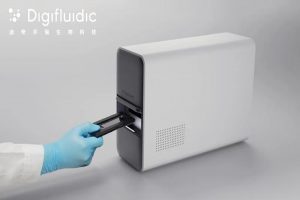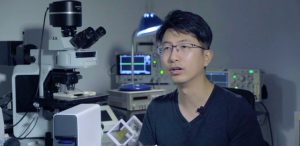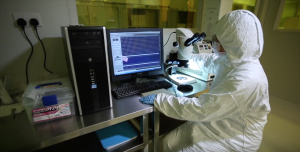In order to realise fast detection of novel coronavirus, the University of Macau (UM) has stepped up the development of a digital-microfluidic-chip-based system to help fight the epidemic. With the help of ‘Virus Hunter’, a rapid test kit developed with UM’s patented technology, the entire virus detection process can be completed within 30 minutes.
The study was conducted by a team formed by researchers from UM’s State Key Laboratory of Analog and Mixed-Signal VLSI (AMS-VLSI) and PhD graduates. The research team has been liaising with medical institutions, and the system will be available to frontline medical personnel soon.
The rapid test kit ‘Virus Hunter’ is developed by Digifluidic Biotech Ltd, based on patented technology from UM. Most nucleic acid reagent test kits for the novel coronavirus available on the market cannot be used to conduct onsite tests; they can only be used inside polymerase chain reaction laboratory (PCR) labs. The ‘Virus Hunter’ test kit includes nasopharyngeal swab, detection chips containing reagent, and equipment for rapid detection. The test kit allows frontline personnel to conduct fast onsite tests on suspected coronavirus patients, thereby shortening the detection process.
Chen Tianlan, founder of Digifluidic Biotech Ltd, is a PhD graduate of UM’s Faculty of Science and Technology and the AMS-VLSI Lab. During his time at UM, he participated in the development of various bio-microelectronics projects, including the Digifluidic Project, and assisted with the commercialisation of related research results. The company was founded by several PhD students at UM. It entered incubation stage on Hengqin island, Zhuhai, in 2017, and was officially established in 2018. The company mainly produces portable pathogen testing devices.
According to Chen, some nucleic acid reagent test kits on the market claim to take less than 30 minutes to complete detection. However, most of them are based on immunological tests and cannot detect viruses in the early stages of infection. In comparison, ‘Virus Hunter‘ uses UM-patented digital microfluidic chips, which replace the manual control part of traditional reagent-based tests with nucleic acid tests and thus can help to increase detection efficiency and reduce the risk of virus transmission.
Since its establishment in 2003, UM’s AMS-VLSI Lab has distinguished itself internationally in chip design and has been actively promoting industry-academia collaboration. The lab is currently ranked second in the world in terms of the number of published academic papers on chip design. In 2019, UM established an industry-academia collaboration base on Hengqin island through the UM Science and Technology Research Institute. The base carries out R&D activities in chip design, IoT applications for smart cities, materials technology, quality research in Chinese medicine, and cancer diagnosis and treatment, while fostering the commercialisation of UM’s research results. Furthermore, via technology transfer and other forms of support, UM nurtures hi-tech companies such as DigiFluidic so they can contribute to Macao, China, and beyond.
Source: Communications Office
Media Contact Information: Communications Office, University of Macau
Albee Lei Tel:(853) 88228004Kelvin U Tel:(853) 88224322Email:prs.media@um.edu.moUM Website:www.um.edu.mo




